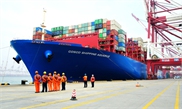SOURCE / INDUSTRIES
Some CIIE orders evaporate as virus dents consumption
World’s second largest buyer to see 8% decline in Q1 imports

The China Pavilion is seen at the second China International Import Expo (CIIE) in Shanghai in November 2019. Photo: Xinhua
Foreign businesses which signed trading contracts with Chinese buyers during November's China International Import Expo (CIIE), the country's largest import exhibition, are finding some of the contracts being delayed or even cancelled, as the outbreak of the coronavirus dealt a sudden blow to the world's second-largest buyer, cooling consumption and suppressing manufacturing.
Such shrinking demand should send China's overall imports down by about 8 percent year-on-year in the first quarter, predicted Chinese economist Liu Xuezhi, who works at a research center under the state-owned Bank of Communications.
Chen Shanwang, a Chinese market representative for German glass and jewel maker Glaskoch B Koch jr, said that of the around 10 million yuan worth ($1.43 million) of contracts the company signed during last year's CIIE with Chinese clients, only several million yuan have been paid.
"Some clients and dealers are postponing payment because they claim their shops were shut down or have done little business during the coronavirus assault. Some, like our clients in Hubei, had to cancel their orders," Chen told the Global Times on Wednesday via telephone.
According to Chen, this is the "darkest moment" since the German brand entered the Chinese market about five years ago. "Usually we see 60 percent sales growth each year. This year, it would be reassuring if sales were on par with 2019," he said, adding that he is "half optimistic and half worried" about the future.
Another representative from a Japanese rice trading company told the Global Times that some of its Chinese clients stopped carrying out business orders made during the CIIE, after the virus outbreak froze business at many restaurants and hotels in the country.
"One of our clients in China, a Japanese restaurant, agreed to purchase five cases of rice from us each week after the CIIE. But recently they stopped purchasing because they said they had no customers," she told the Global Times.
Such cancellations are predictable as a result of the sudden consumption loss in China, industrial insiders say, adding that China's first-quarter foreign trade will slump.
"Overall, the negative impact of the coronavirus on China's first-quarter trade will be relatively large, due to the suddenness of the virus outbreak, with agricultural and labor-intensive products exports, cars and chip imports likely to take a toll," Pang Chaoran, an associate research fellow at the Chinese Academy of International Trade and Economic Cooperation, told the Global Times.
Liu said that consumption-related imports, such as crude oil, iron ore and food, would be hit hard in the short term. But the coronavirus epidemic would boost imports in certain areas like pharmaceutical products. China imported 810 million yuan worth of coronavirus-prevention materials from January 24 to February 2, including 220 million face masks, customs data shows.
Pang also said that trade of raw materials, intermediate and processed goods around the globe will all be hit as Chinese trade companies have difficulties receiving and implementing orders.
China's exports rose by 5 percent year-on-year to 17.23 trillion yuan in 2019, while imports rose by 1.6 percent to 14.31 trillion yuan, customs data shows.
But when it comes to prospects for the future, things might turn out to be not that gloomy, experts and businesspeople said.
Tommy Zhang, director of sales at Fiji Links International Trading Co, a trader of Fiji beer, said that although domestic orders dropped by more than 50 percent after the Spring Festival holiday, some clients are starting to replenish stocks, which is an encouraging sign.
"I believe the coronavirus is just an emergency event and wouldn't affect our peak season, which is in the summer," he said.
Gao Lingyun, an expert at the Chinese Academy of Social Sciences, said that the consumption rebound might be stronger than people's expectations, and China should still see a rise of more than 1.5 percent in overseas trade for the whole year.




